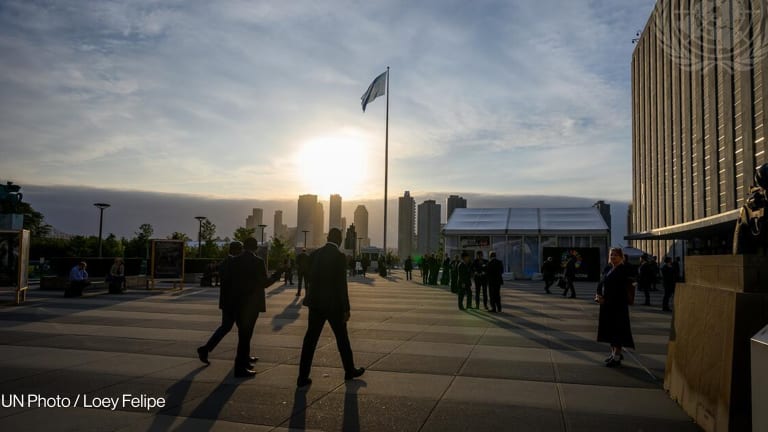
On the second day of the MDG summit in New York, world leaders continued to push for intensified efforts to help achieve the Millennium Development Goals by the 2015 deadline.
Let Poor Nations Take Charge
Improving the effectiveness of development instruments and focusing on priority sectors can help step up efforts to realize the eight goals.
German Chancellor Angela Merkel called for “more results orientation” in enhancing the effectiveness of development policy instruments.
“We need more results orientation. In this regard I think results-based financing is a promising approach,” Merkel said. “[C]lear results orientation can be combined with greater leeway for national policies. This allows for better accommodation of the relevant country’s particularities.”
Good governance, Merkel said, is key to promoting development as poor nations bear the primary responsibility “whether aid can be effective.”
“Development aid cannot continue indefinitely. The task is therefore to use limited resources as effectively as possible,” Merkel said.
Promoting the welfare of indigenous peoples and ethnic minorities, and persons with disabilities, in turn, is the focus of Finland’s push to accelerate the progress on MDGs. Finnish President Tarja Halonen said her nation will continue to scale up funding for development cooperation, which will be increasingly directed to Africa. Finland’s development aid, she said, will reach 0.58 percent of the gross national income next year, thereby keeping the nation on track to reach the target of 0.7 percent of GNI by 2015.
Canada, meantime, will target food security, children and youth, and economic development to help “ensure our aid dollars are used more effectively,” Canadian Prime Minister Stephen Harper said. Harper said Canada will increase its replenishment to the Global Fund to Fight AIDS, Tuberculosis and Malaria.
“At this Summit, our discussions should be less about new agreements than accountability for existing ones; less about lofty promises than real results; and less about narrow self-interest in sovereignty’s name, than an expanded view of mutual-interest in which there is room for all to grow and prosper,” Harper said.
Developing Nations Can ‘Do More’
Rwandan President Paul Kagame called on poor nations to take charge of their own development, saying efforts to achieve the MDGs have “at times been dominated” by donors and aid organizations.
“Despite their good intentions, their perspective is often predicated on paternalism not on partnership, on charity not on self-reliance, and on promises unfulfilled rather than real change on the ground,” he said.
Kagame added: “We in the developing world could do more. We have to reflect deeply on how we have driven this agenda so far and why we are lagging behind on these targets … we must assume effective leadership.”
Ethiopian Prime Minister Meles Zenawi voiced a similar concern.
“There is no doubt in my mind that we in the developing world have to do more and better to take charge of our destiny, to design programs and strategies appropriate to our circumstances and mobilize our own resources as the primary means of achieving the MDGs,” he said.
‘1,000 Days to Improve Child Nutrition’
The U.S. and Ireland unveiled Tuesday (Sept. 21) initiatives that seek to boost child nutrition at the sidelines of the MDG summit.
The initiative will target nutrition interventions from the onset of pregnancy until a child reaches the age of two, which is called the “1,000-day window of opportunity,” United Nations chief Ban Ki-moon said.
The Scaling Up Nutrition roadmap (SUN roadmap) will be used to pinpoint effective nutrition interventions, according to U.S. Agency for International Development Administrator Rajiv Shah. The U.S. will invest more than USD3.5 billion over three years to back country-led plans to combat hunger, said Jose Fernandez, assistant secretary of state for economic, energy and business affairs.
“The 1,000 Day Movement will focus on those countries and regions which are making least progress,” said Irish foreign minister Micheál Martin.
U.S. Secretary of State Hillary Clinton urged nations to commit to make progress toward supporting nutrition interventions outlined in the SUN roadmap.
“And then let’s come back a year from now at UNGA (U.N. General Assembly) to report on how we have aligned our programs with country strategies, and to come back two years from now with evidence that we are reaching more pregnant women and young children, and to come back at the end of our own 1,000 days having achieved a measurable impact on national undernutrition indicators,” Clinton said.
Aid agency Oxfam welcomed such an annual review for these initiatives.
“Today’s announcement sets a strong example to other governments that they should be ready to stand up each year between now and the 2015 deadline and explain what they have done to end extreme poverty,” Oxfam spokesperson Chris Leather said.
Apart from nutrition programs, Oxfam also urged support to small-scale farmers and social protection for poor people to help combat hunger and poverty.
Poverty Reduction
Ban warned that least developed countries are still trapped in poverty.
“The LDCs represent the poorest and most vulnerable segment of humanity,” Ban said Sept 21 at a side event focusing on the MDGs in these countries. “They remain at the epicenter of the developmental emergency.”
The European Union on Monday (Sept. 20) offered USD1.3 billion euros (USD1.7 billion) to help slash extreme poverty, one of the targets of the MDGs, Decan Chronicle reports.
Sustainable Development
Two interactive round-table sessions were held on the sidelines of the MDG summit’s second day.
Malawian President Bingu wa Mutharika and Qatari Emir Sheikh Hamad bin Khalifa Al-Thani led a discussion on promoting sustainable development through increased potable water supply and the improved living conditions of slum dwellers.
Another session co-chaired by Finnish President Tarja Halonen and Slovenian President Danilo Türk tackled climate change, global economic crisis, food security and armed violence that may all hinder the realization of the MDGs.
Ban, in a high-level event last night (Sept. 21) in New York, called for universal energy access, an item that must be on the agenda of global leaders. A lack of political will is the real impediment to ensuring that all people have access to affordable and reliable sources of energy, he said.
The U.N. chief also welcomed the launch yesterday of a global initiative to harness digital technologies to help achieve the MDGs. The “MDGs eNabler” comprises web-based knowledge tools and information resources that will help developing nations advance their efforts to attain the MDGs.
Devex News – live breaking news coverage of the Millennium Development Goals and the Sept. 20-22 U.N. MDG summit in New York.








